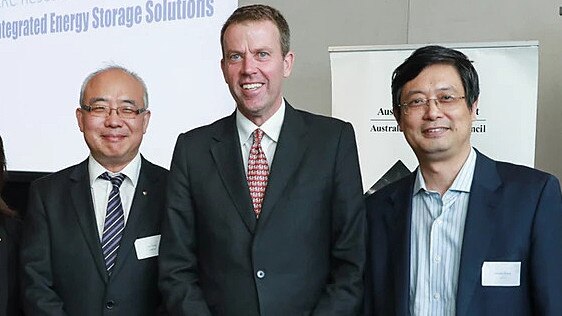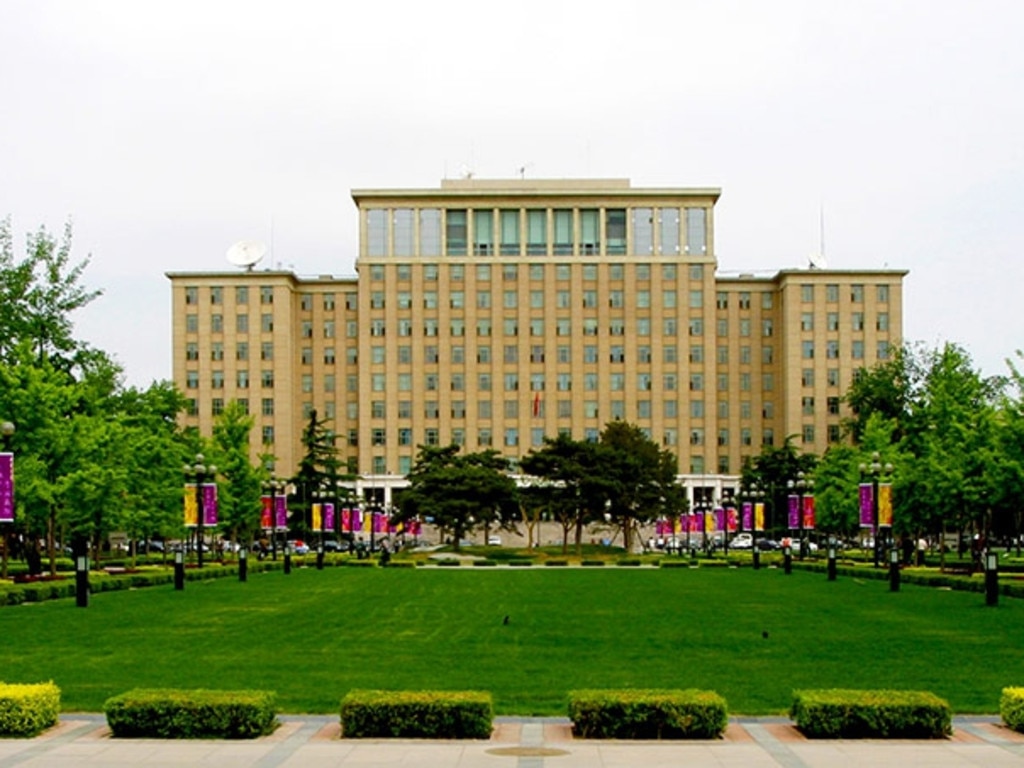China exploits Australia’s lax laws to sign up researchers for secretive program
Beijing is recruiting Australian scientists for a research program that offers lucrative salaries but requires their inventions to be patented in China.

The Chinese government is actively recruiting leading Australian scientists for a secretive research program that offers lucrative salaries and perks but requires their inventions to be patented in China and obliges them to abide by Chinese law.
An investigation by The Australian has revealed dozens of leading scientists at major universities across the country have been recruited to a Chinese government program called the Thousand Talents Plan, which FBI director Christopher Wray describes as economic espionage and a national security threat.
The Australian’s investigation shows that, in many instances, Australian academics have been named in Chinese patent applications despite their Australian universities being unaware of their involvement.
Academics targeted globally under the Thousand Talents Plan may have a field of research with a military application, sparking the risk the Chinese government is misusing their inventions and technology for military advancement and even to develop weapons.
When told about The Australian’s revelations, Andrew Hastie — chair of parliament’s joint intelligence committee — called for a parliamentary inquiry.
Mr Hastie said the revelations demonstrated how national research and intellectual property was “being plundered by the CCP”.
In many of the cases uncovered, universities did not know about academics’ connections to the Thousand Talents Plan and patents lodged in China prior to The Australian presenting the evidence.
UNSW said that at no time had one of its Thousand Talents Plan recipients, Joe Dong, “sold or relinquished patents to any Chinese power companies”.
When presented with evidence that Professor Dong was named in patents lodged with the National Intellectual Property Administration of China just last year, the UNSW spokeswoman said this was done “without his knowledge” and “was in line with the academic culture in China at the time”.
Alongside his salary from UNSW, his institute there has received $15m in Australian government and Australian Research Council funding. But he has also received funding from his Thousand Talents scholarship through the Chinese government’s second largest energy company, China Southern Grid. It paid for Professor Dong to hire researchers at UNSW. He also ran a research program for the company at the university. China’s People’s Daily stated in 2017 that Professor Dong was head of Changsha University of Science and Technology’s School of Electrical and Information Engineering and was part of the Thousand Talents Plan.
Thousand Talents Plan contracts usually legally require the copyright for any research or inventions connected with the program to be registered in China — irrespective of whether the research has been done in Australia or includes Australian funding. In return, academics receive a second salary commonly worth more than $150,000 plus lucrative research grants that can stretch into the millions from a Chinese-affiliated university.
There are a suite of other perks including education for their children, housing allowances and jobs for their spouses.
The Australian’s revelations show the widespread infiltration of Australia’s universities by the Chinese Communist Party, with almost every major institution complicit through its inaction in allowing China to be the beneficiary of its research and inventions.
The Australian can publish the names of more than 30 academics who have been recruited to the Thousand Talents Plan or another similar Chinese government recruitment program, or have registered their intellectual property in China.
In one case uncovered by The Australian, Curtin University’s Optus Chair of Artificial Intelligence, Brad Yu, who has received large amounts of Australian and US government funding, has been working at China’s Hangzhou Dianzi University.
Dianzi is designated “high-risk” for its level of Chinese military defence research, according to the Australian Strategic Policy Institute report entitled China Defence University’s Tracker. It has two major defence laboratories, five designated defence research areas and holds secret security credentials, “allowing it to undertake classified weapons and defence technology projects”.
Professor Yu specialises in drone automation and artificial intelligence, and has been working on an area of intense interest to the Chinese government: aerial warfare and co-ordinating thousands of unmanned aerial vehicles to co-operate in the air.
Chinese-language reports state he is part of Chinese government recruitment programs including the Qianjiang Scholar of Zhejiang Provincial Talents program and the Taishan Scholars Project, Shandong Province.
Despite being on full-time pay at Curtin, where he receives a 60 per cent loading on a professor’s salary and his research institute has been funded to the tune of $4m, The Australian understands he has spent most of the year in China. After The Australian contacted him and Curtin University, Professor Yu’s Hangzhou Dianzi profile became unavailable for public view.
Curtin declined to answer specific questions about him, despite issuing a press release with great fanfare when it appointed him to the role of Optus Chair of Artificial Intelligence in May last year. “In relation to Professor Yu … we have taken, and will continue to take, steps we consider appropriate in managing their association with the university,” a Curtin spokeswoman said.
“It is not our policy to comment publicly on matters concerning individual members of staff or their employment arrangements.
“Professor Yu has spent some time in Western Australia this year, but is currently in China.”
When contacted by The Australian, Brad Yu said: “I was aware of the Thousand Talents Plan run by Chinese enthral government. Your question indicates that you have assumed/believed that I am/was a participant, but this is incorrect.” He declined to answer further questions.
University of Sydney’s mathematics professor specialising in Quantum field theory, Professor Ruibin Zhang, was recruited to the Thousand Talents program in 2018. Monash University’s Associate Dean until 2018, Professor Yi-bing Cheng, a physicist specialising in lasers, was named in more than 10 patents assigned to Chinese universities during his time at Monash, including his current employer, the Wuhan University of Technology, which conducts a high-level of defence research.
There’s also Professor Qiaoliang Bao, a nanotechnology specialist, who was a Thousand Talents recruit while at Monash University and is affiliated with Soochow University, assigning 24 patents to China while on the Monash payroll.
University of Western Australia professor Dongke Zhang, who has received more than $48m in funding from the Australian government and overseas industries, was recruited to the Thousand Talents Plan and is now a professor at Shanxi University and Shenyang Aerospace University, while paid as a full-time professor at UWA. Nine inventions in which he was involved have been assigned to China.
There’s also UNSW professor Jun Wang who has an official position with the People’s Republic of China’s chief administrative authority, the State Council of China, where he sits on the Expert Advisory Committee of the Overseas Chinese Affairs Office.
UNSW said his role on the State Council of China had been disclosed and “discussed with his supervisor” and he said he had never done defence or military research anywhere in the world.
The Australian is not suggesting the academics have acted inappropriately.
Rather, the CCP is taking advantage of lax universities operating in a legal and regulatory framework that does not outlaw programs such as the Thousand Talents Plan.
Investigation launched
The Australian’s investigation has exposed that universities do not know: how many Thousand Talents Plan recipients are in their employ; if their academics are lodging patents in China; and whether their academics are being paid second salaries by affiliated Chinese universities.
UTS denied one of its professors, Guoxiu Wang, was part of the Thousand Talents Plan and objected to the “sullying of the reputations of its senior researchers for their participation in formal international scholarly programs”. When asked why Professor Wang was repeatedly named as a Thousand Talents recipient on Chinese university websites, the UTS spokesman said the term was used “as a sign of respect akin to the term distinguished professor”.
When presented with the evidence that Professor Wang was named in 11 patent applications lodged in China, UTS said: “Professor Wang has no knowledge of 10 out of the 11 patent applications referenced. The 11th patent application is known to the university and results from a funded-research collaboration. Professor Wang has contacted the relevant parties to ask that his name be taken off these applications.”
The University of Queensland was also unaware one of its professors, Zhou Xiaofang, who has participated in the Thousand Talents program, was listed as an inventor on 27 patents assigned to Soochow University in China. Likewise it was unaware another Thousand Talents recipient, professor Li Ling, was the inventor on two patents filed in China with Hohai University as the applicant. And it only discovered that professor Adam Ye had been recruited to the Thousand Talents program after he left the university in 2019.
The University of Newcastle, which said none of its academics had disclosed Thousand Talents affiliations since 2016, has commenced a review after The Australian informed it that its professor Minyue Fu, a control systems and signal processing specialist, had been a Thousand Talents Plan recipient since 2010, was an academic committee member of the South China University of Technology’s autonomous systems lab and was named on about 20 patents assigned to Chinese universities or institutions. “We have commenced a review of these matters raised,” a spokeswoman. “This includes patents overseas, international university memberships and associated MOUs. We anticipate this review will be completed by the end of September. We take the issue of foreign interference very seriously.”
Mr Hastie said an urgent parliamentary inquiry was essential. “Our universities are sovereign institutions, funded by the Commonwealth,” he said. “These revelations demonstrate how national research and intellectual property is being plundered by the CCP. Only a parliamentary inquiry, followed by decisive action, can bring the transparency we need to protect our national interests in this sector.”
Liberal senator James Paterson said: “These are profoundly disturbing revelations. Particularly concerning is the total lack of transparency about these unorthodox arrangements. It’s time to lift the lid with a broad-ranging parliamentary inquiry into foreign interference at Australian universities.”
Signing up
Thousand Talent contracts state that the Chinese university “owns the copyrights of the works, inventions, patents and other intellectual properties produced by Party B during the Contract period”.
Some contracts even order academics to observe Chinese legal system and religious practices, saying they “shall observe relevant laws and regulations of the People’s Republic of China and shall not interfere in China’s internal affairs”. But the contracts also state that academics cannot disclose they are a Thousand Talents recipient without permission, inviting deception with their original western employer. The failure to disclose second incomes is in breach of most university conflict-of-interest policies.
Australian Strategic Policy Institute analyst Alex Joske, who released a report on Chinese talent recruitment programs last week, titled Hunting the Phoenix, said the Thousand Talents program was a major concern that needed better regulation by government and universities. “It leads to uncontrolled technology transfer to China which can lead to commercial harm, harm in terms of giving technology for military transfer to China and moral concerns, for example, concerns that technology developed with Australian funding or institutional backing could be applied to China’s surveillance state or monitoring and imprisonment of minorities and dissidents,” Mr Joske said.
Chen Yonglin, a Chinese diplomat who defected to Australia sparking diplomatic tensions in 2005, said the Thousand Talents Plan was “totally a theft” and warned that the Australian government and universities should take it more seriously.
“China is particularly interested in some world-leading fields of hi-tech in Australia such as quantum science, biotechnology, nanotechnology and new materials, superconducting materials, medical science and other advanced hi-tech,” Mr Chen said.
“Australia should halt all high-level science and technology collaboration with Communist China.”
He said the Thousand Talents Plan was run by all levels of the Chinese government including overseas missions, Chinese organisations affiliated to the Chinese government, and CCP United Front organisations — and they were keeping the program very quiet. “China internet search engines such as baidu.com and sohu.com, Wechat and Weibo have banned the sensitive phrase search of 1000 Talents on April 18, 2020,” Mr Chen said.
The Chinese Government has taken the program underground, censoring and wiping records of academic participation online. Mentions of the program have been erased from scientists’ CVs and censored from Chinese government websites.
Charles Sturt University public ethics academic Clive Hamilton said if there were scholars in Australia on the books of the Thousand Talents program, “then they are in effect working for the Chinese government while being paid to work at Australian universities”.
The US Department of Energy and the US National Science Foundation have banned employees from participating in the Thousand Talents Plan and other recruitment programs, while a US Senate Committee has said the program is a threat to national security. The FBI has launched criminal investigations into Thousand Talents scientists for not declaring second salaries, tax fraud and intellectual property theft, saying it amounted to “economic espionage”.
John Brown, assistant director of the FBI’s counterintelligence division, told the US Senate committee on homeland security and governmental affairs last November that through talent recruitment programs “the Chinese government offers lucrative financial and research benefits to recruit individuals working and studying outside of China who possess access to, or expertise in, high-priority research fields”.
“While mere participation in a talent plan is not illegal, investigations by the FBI and our partner agencies have revealed that participants are often incentivised to transfer to China the research they conduct in the United States, as well as other proprietary information to which they can gain access, and remain a significant threat to the United States,” Mr Brown said.
“In some cases, this has resulted in violations of US laws, including economic espionage, theft of trade secrets, and grant fraud.
“In addition, many talent plan participants sign contracts outlining work that mirrors the research they perform at American institutions. These contracts subject participants to the broad laws of the Chinese government and — ironically — strictly protect China’s right to the patents and other intellectual property developed during work within the talent plan.”
In Australia, the government has no oversight on how many academics with taxpayer funded-grants have been recruited to the Thousand Talents Plan. Whereas FBI director Christopher Wray gave a July speech outlining the risks of the Thousand Talents Plan, a security source said no Australian agency was charged with investigating this issue.
A Department of Home Affairs spokeswoman said the government was working with universities after the introduction of guidelines to counter foreign interference in the sector.
“It is critical that the work of Australian researchers is not undermined by foreign interference and activities that put our universities’ people, information, intellectual property and data at risk,” the spokeswoman said.
Additional reporting: Angira Bharadwaj
Do you know more. Contact Sharri Markson at sharri.markson@news.com.au







To join the conversation, please log in. Don't have an account? Register
Join the conversation, you are commenting as Logout